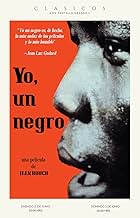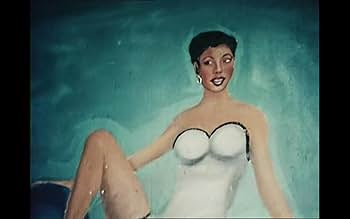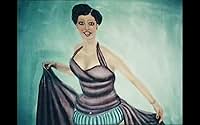NOTE IMDb
7,3/10
1,2 k
MA NOTE
Des Nigériens s'installent à Treichville dans la banlieue d'Abidjan. Comme nombre de leurs compatriotes, ils tentent l'aventure de la ville. Amère aventure pour ceux qui abandonnent leur vil... Tout lireDes Nigériens s'installent à Treichville dans la banlieue d'Abidjan. Comme nombre de leurs compatriotes, ils tentent l'aventure de la ville. Amère aventure pour ceux qui abandonnent leur village et se heurtent à une civilisation mécanisée.Des Nigériens s'installent à Treichville dans la banlieue d'Abidjan. Comme nombre de leurs compatriotes, ils tentent l'aventure de la ville. Amère aventure pour ceux qui abandonnent leur village et se heurtent à une civilisation mécanisée.
- Réalisation
- Scénario
- Casting principal
- Récompenses
- 2 victoires au total
Avis à la une
'Moi un Noir' is an important cinematic document by renowned French anthropologist and filmmaker Jean Rouch. It is highly significant because it has been acclaimed not only as one of Rouch's finest works of 'ethno-fiction', but has also quoted as one of the inspirations for the films of the French Nouvelle Vague. Jean-Luc Godard has quoted this as being one of his biggest influences; the central characters have much in common with his protagonists in features such as 'A bout de soufflé' and 'Le Petit soldat'. They are unsure of where they are or where they are going.
During the Second World War, Rouch had served as an engineer in Africa and he became fascinated with the lives of African immigrants in France and its colonies. From 1947 onwards he had engaged in producing a countless number of films about African life. These films attempted to capture the everyday lives of residents in Niger, Mali and Ghana. He was interested not just in the effects of colonisation on the young of the countries, but also in looking at the contradiction in life between the young in France and those in these colonies.
'Moi un Noir' chronicles the everyday life of several young Africans in Treichville - a poor section in Abidjan, the largest city in the Ivory Coast. These men are immigrants from Niger who have travelled to this large city in order to become successful. The central character is Edward G. Robinson, who speaks to the audience in a voice-over narration, which gives the film its unique style. Throughout the film there is a sense that the young protagonists wish to be somewhere else, but are unable to get anywhere. It seems, however that the residents of Treichville are much the same, with the sections of town being called New York and Chicago.
These young men are also people who long to be somebody else. The central characters in the film are named after famous 'tough-guy' actors such as Edward G. Robinson and Eddie Constantine. The kids talk like these tough guys, but their encounters with others repeatedly tells us that they are a far cry from their heroes. The film also follows 'Robinson' in his attempts to find a mate and the problems which arise as a result.
'Moi un Noir' is a fascinating film and acts as a snapshot of what life was like for those residents of the colony in that decisive time between the war and independence. In addition, it is highly recommended if you are interested in the history of 'cinema verite' or the ethnographic film.
During the Second World War, Rouch had served as an engineer in Africa and he became fascinated with the lives of African immigrants in France and its colonies. From 1947 onwards he had engaged in producing a countless number of films about African life. These films attempted to capture the everyday lives of residents in Niger, Mali and Ghana. He was interested not just in the effects of colonisation on the young of the countries, but also in looking at the contradiction in life between the young in France and those in these colonies.
'Moi un Noir' chronicles the everyday life of several young Africans in Treichville - a poor section in Abidjan, the largest city in the Ivory Coast. These men are immigrants from Niger who have travelled to this large city in order to become successful. The central character is Edward G. Robinson, who speaks to the audience in a voice-over narration, which gives the film its unique style. Throughout the film there is a sense that the young protagonists wish to be somewhere else, but are unable to get anywhere. It seems, however that the residents of Treichville are much the same, with the sections of town being called New York and Chicago.
These young men are also people who long to be somebody else. The central characters in the film are named after famous 'tough-guy' actors such as Edward G. Robinson and Eddie Constantine. The kids talk like these tough guys, but their encounters with others repeatedly tells us that they are a far cry from their heroes. The film also follows 'Robinson' in his attempts to find a mate and the problems which arise as a result.
'Moi un Noir' is a fascinating film and acts as a snapshot of what life was like for those residents of the colony in that decisive time between the war and independence. In addition, it is highly recommended if you are interested in the history of 'cinema verite' or the ethnographic film.
4/4 "Life is sacks" says young Nigerien immigrant Oumarou Ganda in Jean Rouch's most controversial scene from his 1958 ethnofiction film Moi, un noir. Oumarou — who under his pseudonym Edward G. Robinson (An actor, Double Indemnity, The Ten Commandments) — tells us of his conquests with European women and his travels to exotic locations. Rouch then cuts to the implied truth: Oumarou unloading sacks from a cargo ship. Oumarou is consumed by a life of poverty and meaniality, he's tired of carrying sacks. He has aspirations, he has dreams, and with Moi, un noir an improvised docu-fiction piece he finds a way to live out his fantasy.
Filled with ambition, but tragically amateurish. Seems they couldn't afford a camera that recorded sound so every line is added in afterwords. This is carried out by two men calling themselves Edward G. Robinson and Eddie Constantine, though the latter only dubs/narrates 5 minutes or so.
The biggest weakness is that the narrator "dubs" scenes, i.e. narrates them as if he was in the situation at hand and talks to the individuals, it's obviously incredibly out of sync and comes off as plain silly. To make things worse we get badly staged scenes, like a climax fight, while "Robinson" continues to narrates is thoughts and supposed dialog, often presented through weak or badly done jokes. It's obvious that they are trying to make something special, but this is just plain bad.
The biggest weakness is that the narrator "dubs" scenes, i.e. narrates them as if he was in the situation at hand and talks to the individuals, it's obviously incredibly out of sync and comes off as plain silly. To make things worse we get badly staged scenes, like a climax fight, while "Robinson" continues to narrates is thoughts and supposed dialog, often presented through weak or badly done jokes. It's obvious that they are trying to make something special, but this is just plain bad.
Ethnographic filmmaker Jean Rouch pioneered a new type of film by recruiting a small group of immigrants from Niger living in Abidjan in the Ivory Coast, and constructed a fictionalized documentary about a week in their lives with their very active input. Rouch followed them with a16mm camera and filmed a week in their lives, largely following their guidance as to what should be shot.
Rouch assembled an edit of the footage, and then brought the subjects to a studio in Paris where they provided a narration which was assembled and recorded and laid over the footage. This allowed Oumarou Ganda, Petit Touré, Alassane Maiga and Amadou Demba. To construct a narrative that "explained" their day-to-day lives.
It's a fascinating blend of documentary truth with the kind of truth one gets from a story, only its a story constructed mainly by it's own characters.
Rouch assembled an edit of the footage, and then brought the subjects to a studio in Paris where they provided a narration which was assembled and recorded and laid over the footage. This allowed Oumarou Ganda, Petit Touré, Alassane Maiga and Amadou Demba. To construct a narrative that "explained" their day-to-day lives.
It's a fascinating blend of documentary truth with the kind of truth one gets from a story, only its a story constructed mainly by it's own characters.
Whatever the interest today in the lives of several menial workers in the late 1950s Ivory Coast or the background described of their city Abidjan, the abiding significance of director Rouch,s project in this and several other documentaries about Africa is the way he offered his subjects a full participation in the way they would be filmed.He was not your typical white European ethnographer observing and then telling us, often via condescending narration, what he thinks he sees.An approach,as demonstrated by non fiction works made before this, that can lead to misunderstanding and distortion.Instead Rouch asked the actors to tell him what they wanted him to shoot, allowed them to improvise, and followed them unobtrusively with just one camera and no additional crew.He also showed them the rushes and asked their advice on how to edit them.This was a remarkable step forward in the freedom with which documentaries could be made,if the filmmakers of the future cared enough to absorb the lesson.
Le saviez-vous
- AnecdotesHollywood movie figures referenced in the film are Edward G Robinson, Dorothy Lamour, Tarzan and Jane, and Marlon Brando.The French moviestar Eddie Constantine is also referenced.
- ConnexionsFeatured in Deux de la Vague (2010)
Meilleurs choix
Connectez-vous pour évaluer et suivre la liste de favoris afin de recevoir des recommandations personnalisées
Détails
- Date de sortie
- Pays d’origine
- Site officiel
- Langues
- Aussi connu sous le nom de
- Treichville
- Lieux de tournage
- Abidjan, Ivory Coast(main location)
- Société de production
- Voir plus de crédits d'entreprise sur IMDbPro
- Durée1 heure 10 minutes
- Mixage
- Rapport de forme
- 1.37 : 1
Contribuer à cette page
Suggérer une modification ou ajouter du contenu manquant

Lacune principale
By what name was Moi, un noir (1958) officially released in Canada in English?
Répondre



















